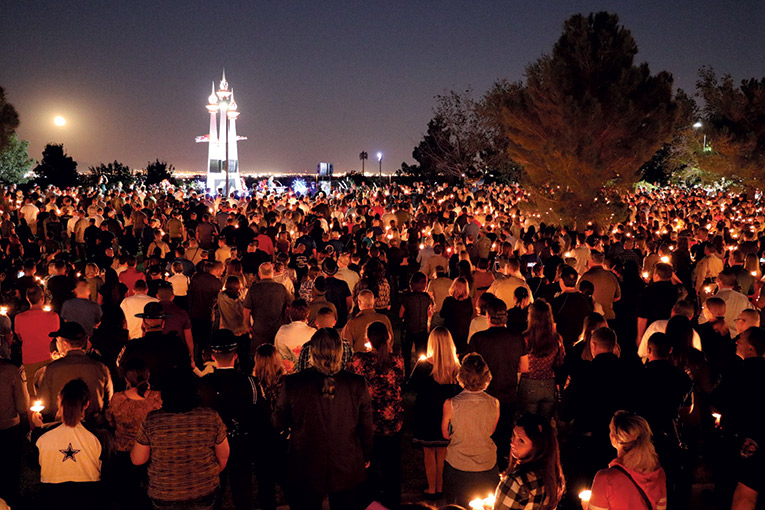
President
I hope that this first article of 2019 finds all of our members and their families happy, healthy and ready to tackle the new year. I wanted to start the new year off with an article related to the infamous Contact Report (cue the music… dun dun duuuuuun!). Many people have some misconceptions about what a Contact Report is and how it can help or, more importantly, hurt your career.
The Contact Report replaced what was called an oral reprimand. I myself received my first oral reprimand back in 1998 for an on-duty accident.
I went to the Accident Review Board and told them that I had my head up my butt when I backed into something. When I walked out of the hearing, I was told to come back in after one minute. When I returned, I was given my oral reprimand, which consisted of something along the lines of, “Pay better attention. See ya around kid.”
Now the evolution of how we got away from the oral and moved into the Contact Report was in part because when the Department went to discipline someone, they would cite a previous oral and an officer would say, “I have no idea what you’re talking about. I was never counseled about this.” Thus, the Contact Report came about to document conversations between a supervisor and the troops. This documentation is kept in your station file, not your personnel file, for up to one year, or when your next evaluation comes up. Rarely do I see officers getting positive Contact Reports. It happens, but it is rare. The negative Contact Reports are used far more than the positive ones. The good ones P# 5466 should be used more; they show that an officer is doing things above and beyond what is required, and they could help when an officer goes to test for another position.
Let’s focus on negative Contact Reports. A negative Contact Report does not count as “discipline” per se; rather it is the first level of documenting bad performance or low-level misconduct. Understand that when you test for anything on this Department and they ask if you have any “discipline” in your file, no matter if you have one negative Contact or 20, the answer is “no.” A Contact Report is not discipline and thus doesn’t count against you in that forum.
But a Contact Report will absolutely be used as a building block for discipline or administrative transfer. We have observed this time and time again. No matter how much education we provide our members on Contact Reports, some information still slips through the cracks. I hope this article gives you the information you need to fight against Contact Reports and informs you about what your rights are in relation to these reports.
- Do you have to sign a Contact? The answer is no, you do not. The supervisor’s policy outlines what to do should an employee refuse to sign a Contact. They must bring in another supervisor, write “refused” on the signature line and list the other supervisors who were present. This is to prevent a supervisor from drafting a Contact, writing “refused” and slipping it into your file without your knowledge.
- Can I rebut the Contact? The answer is 100% yes, and, in most cases of a negative Contact, you absolutely should. If a supervisor gives you a Contact and the report is not accurate or you flat-out disagree with what was written, the only way to put your side of it out there is to rebut the Contact. Typically, a member of the Executive Board can help you write the rebuttal. Once written, a supervisor must attach the rebuttal to the Contact. You have 30 days to write the rebuttal. If you do not rebut the Contact, someone in Labor Relations or an arbitrator will assume that you agree with what was written about that incident. Not writing a rebuttal hurts you. When a supervisor starts to build the “paper trail” of Contact Reports on you and then uses those Contacts to Administrative Transfer you or as the first steps in Progressive Discipline, without your rebuttal, a Labor Management board or someone else may deem those to be accurate accounts of what took place.
We ask that officers who receive Contact Reports for any allegation of misconduct to please send a copy to us at the PPA. When we fight discipline cases, one of the ways we get discipline reduced is by providing comparable discipline. The Department maintains that a Contact is not discipline and thus only provides written reprimands or more when we ask for comparable discipline. We know members have received Contacts in the past, but if we don’t have them on file, ready to produce, then we can’t win that argument. If we can produce it, then it makes our argument for a reduction in another case that much stronger. So please, send us copies of your Contacts. We will file them for use when it is time to help another officer in a disciplinary case.
I hope this article has shed some light on the Contact Report for our members. If something comes up and you’re not sure how to handle it, call us before you sign or do anything. Always get our advice on issues, especially those related to discipline. Thanks so much and stay safe out there.


